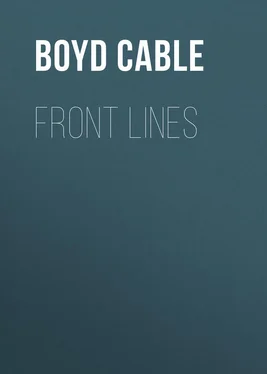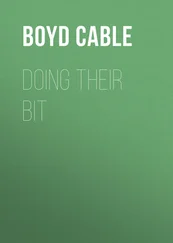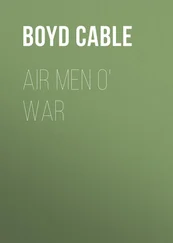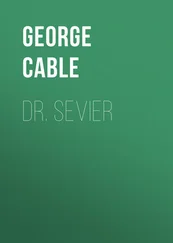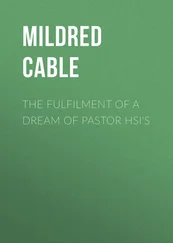Boyd Cable - Front Lines
Здесь есть возможность читать онлайн «Boyd Cable - Front Lines» — ознакомительный отрывок электронной книги совершенно бесплатно, а после прочтения отрывка купить полную версию. В некоторых случаях можно слушать аудио, скачать через торрент в формате fb2 и присутствует краткое содержание. Жанр: foreign_antique, foreign_prose, на английском языке. Описание произведения, (предисловие) а так же отзывы посетителей доступны на портале библиотеки ЛибКат.
- Название:Front Lines
- Автор:
- Жанр:
- Год:неизвестен
- ISBN:нет данных
- Рейтинг книги:3 / 5. Голосов: 1
-
Избранное:Добавить в избранное
- Отзывы:
-
Ваша оценка:
- 60
- 1
- 2
- 3
- 4
- 5
Front Lines: краткое содержание, описание и аннотация
Предлагаем к чтению аннотацию, описание, краткое содержание или предисловие (зависит от того, что написал сам автор книги «Front Lines»). Если вы не нашли необходимую информацию о книге — напишите в комментариях, мы постараемся отыскать её.
Front Lines — читать онлайн ознакомительный отрывок
Ниже представлен текст книги, разбитый по страницам. Система сохранения места последней прочитанной страницы, позволяет с удобством читать онлайн бесплатно книгу «Front Lines», без необходимости каждый раз заново искать на чём Вы остановились. Поставьте закладку, и сможете в любой момент перейти на страницу, на которой закончили чтение.
Интервал:
Закладка:
She wheeled on to the road, and as the dispatch-rider, with mingled awe, amazement, and admiration, watched her lumbering off down it he saw an oil-blackened hand poked out through a gun port and waggled triumphantly back at him. “Damme,” he said, “I believe she can swim, or stand on her head, or eat peas off a knife. She looks human-intelligent enough for anything.”
But the Hotstuff on that particular trip was to display little enough intelligence, but instead an almost human perversity, adding nothing to her battle honours but very much to her skipper’s and crew’s already overcrowded vocabulary of strong language. The engineer showed signs of uneasiness as she trundled down the road, cocking his head to one side and listening with a look of strained attention, stooping his ear to various parts of the engines, squinting along rods, touching his finger-tips to different bearings.
“What’s wrong?” asked the Skipper. “Isn’t she behaving herself?”
The engineer shook his head. “There’s something not exactly right wi’ her,” he said slowly. “I doubt she’s going to give trouble.”
He was right. She gave trouble for one slow mile, more trouble for another half-mile, and then most trouble of all at a spot where the road had degenerated into a sea of thin, porridgy mud. We will say nothing of the technical trouble, but it took four solid hours to get the Hotstuff under way again. The road where she halted was a main thoroughfare to the firing line, and the locality of her break-down, fortunately for the traffic, was where a horse watering trough stood a hundred yards back from the road, and there was ample room to deflect other vehicles past the Hotstuff obstacle, which lay right in the fair-way. All the four hours a procession of motor-cars and lorries, G.S. waggons, and troops of horses streamed by to right and left of the helpless Hotstuff. The cars squirted jets of liquid mud on her as they splashed past, the lorries flung it in great gouts at her, the waggons plastered her lower body liberally, and the horses going to and from water raised objections to her appearance and spattered a quite astonishing amount of mud over her as high as her roof.
When finally she got her engines running and pulled out of the quagmire, it was too late to attempt to get her up into the action she had been called to, so her bows were turned back to her anchorage and she plodded off home. And by the luck of war, and his volunteering out of turn for the trip, the same dispatch-rider brought another message to her early next morning in her berth behind the line.
The crew’s night had been spent on internal affairs, and, since there had been no time to attempt to remove any of the accumulation of mud that covered every visible inch of her, she looked like a gigantic wet clay antheap.
The dispatch-rider stared at her.
“Looks as if she wanted her face washed,” he remarked. “What has she been up to? Thought you said she was going swimming. She don’t look much as if she’d had a bath lately.”
His former glib informant slowly straightened a weary back, checked a tart reply, and instead spoke with an excellent simulation of cheeriness.
“Didn’t you come an’ watch us yesterday, then?” he said. “Well, you missed a treat – brand-new dodge our Old Man has invented hisself. When we got ’er in the canal, we closed all ports, elevated our periscope an’ new telescopic air-toob, submerged, and sank to the bottom. And she walked four measured miles under water along the bottom o’ the canal. That” – and he waved his hand towards the mud-hidden Hotstuff – “is where she got all the mud from.”
And to this day that dispatch-rider doesn’t know whether he told a gorgeous truth or a still more gorgeous lie.
V
IN THE MIST
Whenthe Lieutenant turned out of his dug-out in the very small hours, he found with satisfaction that a thin mist was hanging over the ground.
“Can’t see much,” he said half an hour later, peering out from the front trench. “But so much the better. Means they won’t be so likely to see us. So long, old man. Come along, Studd.”
The other officer watched the two crawl out and vanish into the misty darkness. At intervals a flare light leaped upward from one side or the other, but it revealed nothing of the ground, showed only a dim radiance in the mist and vanished. Rifles crackled spasmodically up and down the unseen line, and very occasionally a gun boomed a smothered report and a shell swooshed over. But, on the whole, the night was quiet, or might be called so by comparison with other nights, and the quietness lent colour to the belief that the Hun was quietly evacuating his badly battered front line. It was to discover what truth was in the report that the Lieutenant had crawled out with one man to get as near as possible to the enemy trench – or, still better, into or over it.
Fifty yards out the two ran into one of their own listening posts, and the Lieutenant halted a moment and held a whispered talk with the N.C.O. there. It was all quiet in front, he was told, no sound of movement and only a rifle shot or a light thrown at long intervals.
“Might mean anything, or nothing,” thought the Lieutenant. “Either a trench full of Boche taking a chance to sleep, or a trench empty except for a ‘caretaker’ to shoot or chuck up an odd light at intervals.”
He whispered as much to his companion and both moved carefully on. The ground was riddled with shell-holes and was soaking wet, and very soon the two were saturated and caked with sticky mud. Skirting the holes and twisting about between them was confusing to any sense of direction, but the two had been well picked for this special work and held fairly straight on their way. No light had shown for a good many minutes, and the Lieutenant fancied that the mist was thickening. He halted and waited a minute, straining his eyes into the mist and his ears to catch any sound. There was nothing apparently to see or hear, and he rose to his knees and moved carefully forward again. As he did so a flare leaped upward with a long hiss and a burst of light glowed out. It faintly illumined the ground and the black shadows of shell-holes about them, and – the Lieutenant with a jump at his heart stilled and stiffened – not six feet away and straight in front, the figure of a man in a long grey coat, his head craned forward and resting on his arms crossed in front of him and twisted in an attitude of listening. Studd, crawling at the Lieutenant’s heels, saw at the same moment, as was told by his hand gripped and pressing a warning on the Lieutenant’s leg. The light died out, and with infinite caution the Lieutenant slid back level with Studd and, motioning him to follow, lay flat and hitched himself a foot at a time towards the right to circle round the recumbent German. The man had not been facing full on to them, but lay stretched and looking toward their left, and by a careful circling right the Lieutenant calculated he would clear and creep behind him. A big shell-crater lay in their path, and after a moment’s hesitation the Lieutenant slid very quietly down into it. Some morsels of loose earth crumbled under him, rolled down and fell with tiny splashings into the pool at the bottom. To the Lieutenant the noise was most disconcertingly loud and alarming, and cursing himself for a fool not to have thought of the water and the certainty of his loosening earth to fall into it, he crouched motionless, listening for any sound that would tell of the listening German’s alarm.
Another light rose, filling the mist with soft white radiance and outlining the edge of the crater above him. It outlined also the dark shape of a figure halted apparently in the very act of crawling down into the crater from the opposite side. The Lieutenant’s first flashing thought was that the German watcher had heard him and was moving to investigate, his second and quick-following was of another German holding still until the light fell. But a third idea came so instantly on the other two that, before the soaring flare dropped, he had time to move sharply, bringing the man’s outline more clearly against the light. That look and the shape, beside but clear of the body, of a bent leg, crooked knee upward, confirmed his last suspicion. Studd slid over soundless as a diving otter and down beside him, and the Lieutenant whispered, “See those two on the edge?”
Читать дальшеИнтервал:
Закладка:
Похожие книги на «Front Lines»
Представляем Вашему вниманию похожие книги на «Front Lines» списком для выбора. Мы отобрали схожую по названию и смыслу литературу в надежде предоставить читателям больше вариантов отыскать новые, интересные, ещё непрочитанные произведения.
Обсуждение, отзывы о книге «Front Lines» и просто собственные мнения читателей. Оставьте ваши комментарии, напишите, что Вы думаете о произведении, его смысле или главных героях. Укажите что конкретно понравилось, а что нет, и почему Вы так считаете.
